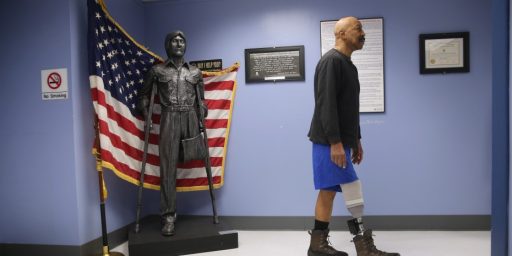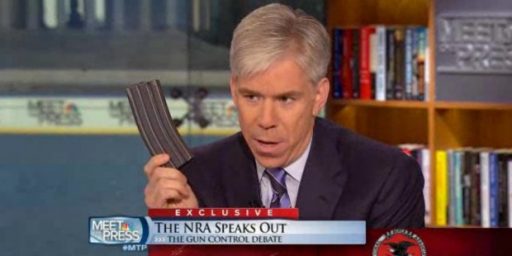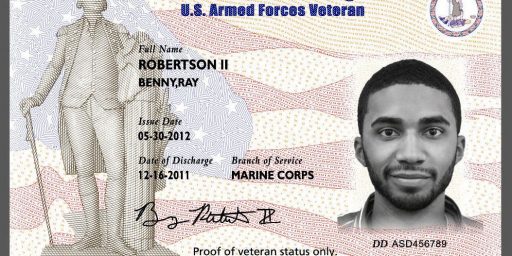WWII Vet Gets Belated Aid
Steve Botello, a fellow Jacksonville State grad and officer in the DC chapter its Alumni Association, helped an 86-year-old World War Two vet get some benefits he deserved–and needed.
It made the papers:
Manassas Journal-Messenger
Matt Hourihan
Potomac News
Wednesday, June 16, 2004
Prince William resident Steven Botello spent Tuesday morning at the Manassas VFW with employees of Disabled American Veterans, trying to hash out a plan of action. But the effort wasn’t for himself.
Joe Nycz, a veteran of World War II, cut Botello’s hair twice a month ever since Botello moved to the area in 1997. The two men would chat in Nycz’s Old Town Manassas barbershop, and Botello eventually learned that Nycz had been shot twice while fighting in Europe.
But Nycz’s injuries were mild flesh wounds and had gone unreported. He had never followed up on benefits for which he was eligible, even after he began receiving food stamps along with his Social Security and a small veterans’ pension.
Botello knew that Nycz, 86, was slowing down and had little money. The former artilleryman, who witnessed firsthand the Battle of the Bulge, struggled to pay his rent. His memory was failing, and Botello suspected, among other things, that Nycz suffered from post traumatic stress disorder. Himself a 1993 retiree of the U.S. Navy, Botello decided to help.
“I’d listened to his stories, and the more I listened, it became evident that he wasn’t getting the help he needed,” said Botello, 43.
The owners of Speedo’s Deli, also in Old Town, held Nycz’s papers for safekeeping, so Botello began there. His efforts eventually brought the two men to the Manassas VFW on Tuesday, where the Disabled American Veterans’ Mobile Service Unit would be stationed for the day.
“It’s a godsend that they came here,” said Botello.
Employees from the veterans organization spent eight hours providing benefits counseling and filing assistance as part of their ongoing outreach program.
“We started coming out because we noticed a lack of claims coming in from the surrounding cities,” said National Service Officer Kevin Gregory, who works from the Washington, D.C., office.
Many veterans simply can’t make the trip into the city and so Disabled American Veterans initiated the mobile office program, he said. The organization’s modified truck has visited many locations in Northern Virginia and Maryland over the last few weeks.
“If we help one today, next time three will show up,” said Gregory.
Disabled American Veterans is a non-profit organization with over 1 million members and offices in every state.
Gregory said that many veterans don’t understand the U.S. Department of Veterans Affairs’ benefits system, don’t know how to file their claims or aren’t aware of the full range of benefits, such as payment for convalescence after service-related surgery.
“In some cases even today, there are active-duty personnel that don’t know their benefits and don’t go to the benefits briefings,” said Gregory. “There’s a lot of frustration because they don’t understand the system.
“We sit them down and explain it to them,” he said.
Gregory knows what it’s like to deal with the benefits system. During the first Gulf War, he was wounded by a land mine while in the Army, but wasn’t aware of his options. Luck and a fellow soldier brought Disabled American Veterans to his attention. The organization was able to help him.
“I never would have known without them,” he said.
Now, however, he certainly understands the system. The organization has a comprehensive testing and review system for its service officers, so that they develop full understanding of not only the benefits system but laws and court precedents that deal with veterans.
The Washington, D.C., area has a high population of veteran, said Gregory. He estimated that there are about 300,000 veterans in the area. “There’s just no way to service them all,” he said. Fifteen individuals came in the first hour Tuesday morning, leading Gregory to believe there were many more. “This is our first time, but it won’t be our last time,” he said.
Among the visitors were Nycz and Botello. National Service Officer Paul Sydorko sat with them both and recounted Nycz’s ailments.
After a time, Sydorko outlined a strategy and offered Disabled American Veterans’ help with the process. He added that there could be plenty of paperwork.
“I’ll walk him through everything,” said Botello. “I just want them to take care of him as best they can.”






Steve continues the fine tradition of service members helping each other.
I am curious about one point, though. The article says that Steve is 43 and retired from the Navy in 1993. That would mean that he retired at the age of 32, or thereabouts. How did that happen? Medical retirement, maybe?
Or am I just being nosy?
The story was the first I’d heard of it but, yes, I’m presuming that’s the story.
—